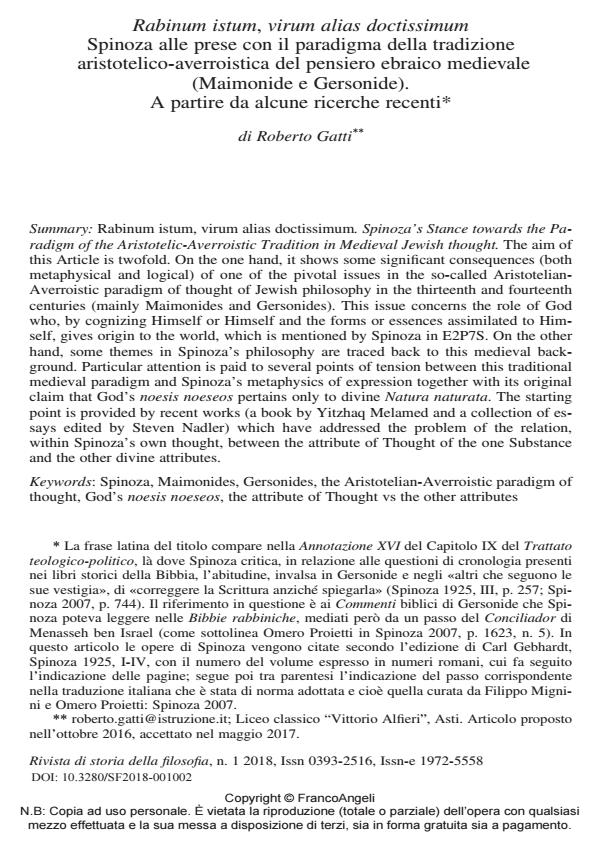Rabinum istum, virum alias doctissimum Spinoza alle prese con il paradigma della tradizione aristotelico-averroistica del pensiero ebraico medievale (Maimonide e Gersonide). A partire da alcune ricerche recenti
Titolo Rivista RIVISTA DI STORIA DELLA FILOSOFIA
Autori/Curatori Roberto Gatti
Anno di pubblicazione 2018 Fascicolo 2018/1
Lingua Italiano Numero pagine 27 P. 29-55 Dimensione file 175 KB
DOI 10.3280/SF2018-001002
Il DOI è il codice a barre della proprietà intellettuale: per saperne di più
clicca qui
Qui sotto puoi vedere in anteprima la prima pagina di questo articolo.
Se questo articolo ti interessa, lo puoi acquistare (e scaricare in formato pdf) seguendo le facili indicazioni per acquistare il download credit. Acquista Download Credits per scaricare questo Articolo in formato PDF

FrancoAngeli è membro della Publishers International Linking Association, Inc (PILA)associazione indipendente e non profit per facilitare (attraverso i servizi tecnologici implementati da CrossRef.org) l’accesso degli studiosi ai contenuti digitali nelle pubblicazioni professionali e scientifiche
Rabinum istum, virum alias doctissimum. Spinoza’s Stance towards the Paradigm of the Aristotelic-Averroistic Tradition in Medieval Jewish thought. The aim of this Article is twofold. On the one hand, it shows some significant consequences (both metaphysical and logical) of one of the pivotal issues in the so-called Aristotelian-Averroistic paradigm of thought of Jewish philosophy in the thirteenth and fourteenth centuries (mainly Maimonides and Gersonides). This issue concerns the role of God who, by cognizing Himself or Himself and the forms or essences assimilated to Himself, gives origin to the world, which is mentioned by Spinoza in E2P7S. On the other hand, some themes in Spinoza’s philosophy are traced back to this medieval background. Particular attention is paid to several points of tension between this traditional medieval paradigm and Spinoza’s metaphysics of expression together with its original claim that God’s noesis noeseos pertains only to divine Natura naturata. The starting point is provided by recent works (a book by Yitzhaq Melamed and a collection of essays edited by Steven Nadler) which have addressed the problem of the relation, within Spinoza’s own thought, between the attribute of Thought of the one Substance and the other divine attributes.
Parole chiave:Spinoza, Maimonides, Gersonides, the Aristotelian-Averroistic paradigm of thought, God’s noesis noeseos, the attribute of Thought vs the other attribute
- Ibn Gabirol (Avicebron) Roberto Gatti, pp.383 (ISBN:978-2-503-60552-4)
Roberto Gatti, Rabinum istum, virum alias doctissimum Spinoza alle prese con il paradigma della tradizione aristotelico-averroistica del pensiero ebraico medievale (Maimonide e Gersonide). A partire da alcune ricerche recenti in "RIVISTA DI STORIA DELLA FILOSOFIA" 1/2018, pp 29-55, DOI: 10.3280/SF2018-001002